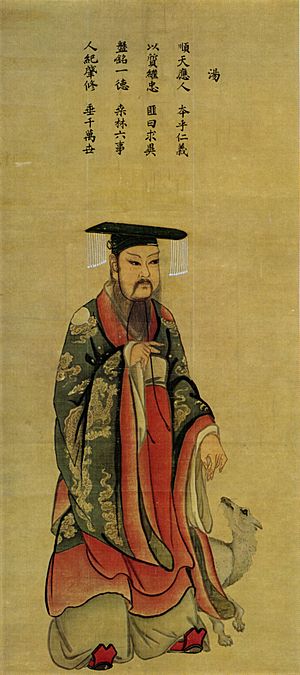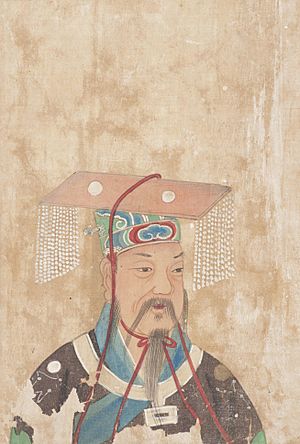Tang of Shang facts for kids
Quick facts for kids Tang |
|||||||||
|---|---|---|---|---|---|---|---|---|---|

Depiction of King Tang by Ma Lin
|
|||||||||
| King of the Shang dynasty | |||||||||
| Successor |
|
||||||||
| Leader of the Predynastic Shang | |||||||||
| Predecessor | Zhu Gui | ||||||||
| Issue | Da Ding, Bu Bing | ||||||||
|
|||||||||
| Tang of Shang | |||||||||||||||||||||||||
|---|---|---|---|---|---|---|---|---|---|---|---|---|---|---|---|---|---|---|---|---|---|---|---|---|---|
| Traditional Chinese | 湯 | ||||||||||||||||||||||||
| Simplified Chinese | 汤 | ||||||||||||||||||||||||
|
|||||||||||||||||||||||||
| Alternative Chinese name | |||||||||||||||||||||||||
| Chinese | 太乙 | ||||||||||||||||||||||||
|
|||||||||||||||||||||||||
Cheng Tang (born Zi Lü), also known as Tai Yi, was a very important leader in ancient China. He became the first king of the Shang dynasty. People often called him Tang the Perfect because he was seen as a good and fair ruler. Legend says he bravely overthrew Jie, who was the last king of the earlier Xia dynasty.
Contents
How Tang Rose to Power
Tang was the leader of Shang, which was one of many smaller kingdoms under the control of the Xia dynasty. He ruled Shang for 17 years. During the time of King Jie, the Shang kingdom grew stronger. Tang managed to gain support from many other smaller kingdoms, about 40 of them!
Tang saw that King Jie treated his own people very badly. Tang used this to convince others to join him. A famous story says that Tang felt he had to act. He believed that the "Mandate of Heaven" (a belief that heaven gives a ruler the right to rule, and can take it away if they are bad) meant he had to overthrow Jie. He even pointed out that Jie's own army generals were starting to disobey him.
Around the 15th year of Jie's rule, Tang started moving his main city to Bo. Later, Shang sent a trusted advisor, Yi Yin, to visit Jie. Yi Yin stayed in the Xia capital for about three years.
Shang's power kept growing. They conquered other areas like Wen. Even though Shang faced some challenges, they continued to expand. They gathered many allied soldiers. The Shang army conquered places like Mixu and Gu. Around this time, Jie's chief historian, Zhong Gu, even left Xia and joined Shang.
The Big Battle at Mingtiao
The Shang army fought a huge battle against Jie's Xia forces. This battle happened at a place called Mingtiao during a big thunderstorm. The Shang army won a great victory.
King Jie managed to escape after the battle. But the Shang forces, led by their general Wuzi, chased him down. They captured Jie and removed him from power. This was the end of the Xia dynasty. Jie was sent away to a place called Nanchao, where he later died. After this, Tang became the new supreme King, starting the Shang dynasty.
Tang as King of the Shang Dynasty
People in China remembered Tang's time as king as a very good period. He made life better for his people. He lowered taxes and asked for fewer soldiers to join the army. His influence spread far, reaching the Yellow River. Many tribes from distant areas became allies of the Shang kingdom. Tang also made Anyang the new capital city of China.
According to ancient records called the Bamboo Annals, King Tang built a special palace. It was named Xia She, and it was built to remember the Xia dynasty that he had overthrown.
In the first five years of his rule, there were several droughts, meaning not enough rain. This made it hard for people to grow food. Tang ordered special golden coins to be made. He gave these coins to poor families who had been forced to sell their children because of the drought. The idea was for them to use this money to buy their children back.
The Bamboo Annals also say that in the ninth year of his reign, Tang moved the famous Nine Tripod Cauldrons to the Shang Palace. These cauldrons were very important symbols of power, said to have been made by Yu the Great, a legendary ancient ruler.
Myths and Legends About Tang
Over time, many stories and legends grew around King Tang. These stories often show him in different ways.
He is sometimes described in old tales as being very tall, about nine feet! He was said to have a white face, a beard, a pointed head, and arms with six joints. His body was also described as being noticeably larger on one side than the other.
There's also a tradition that says much of the ancient book I Ching was written by Tang of Shang.
|
Tang of Shang
Predynastic Shang / Shang dynasty
|
||
| Regnal titles | ||
|---|---|---|
| Preceded by Zhu Gui |
King of Shang | Succeeded by Himself as King of the Shang dynasty |
| Preceded by Jie (Xia dynasty) |
King of China | Succeeded by Da Ding |
See also
 In Spanish: Shāng Tāng para niños
In Spanish: Shāng Tāng para niños
 | Georgia Louise Harris Brown |
 | Julian Abele |
 | Norma Merrick Sklarek |
 | William Sidney Pittman |


